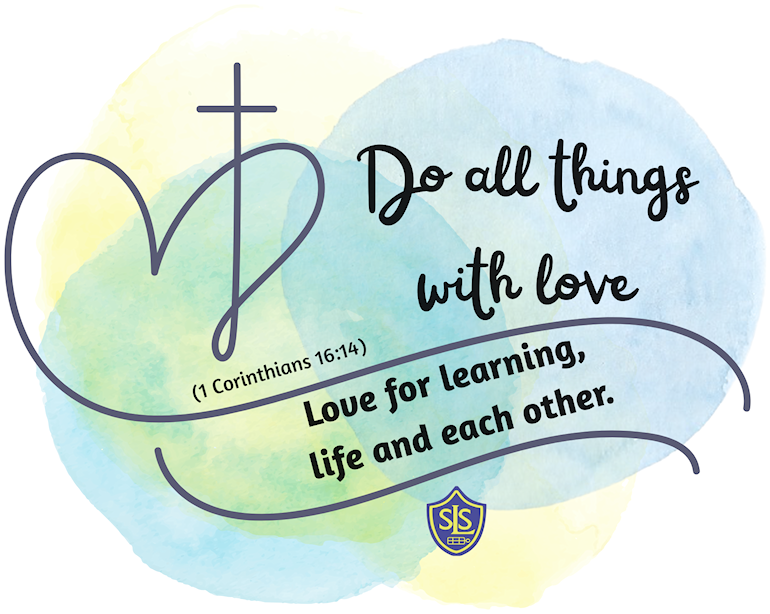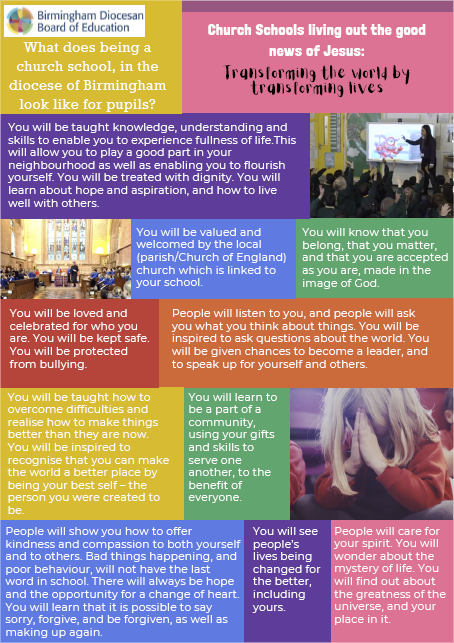Vision and Values
Our School Vision

Our Christian Values
Christian values are the ways Jesus taught people to treat each other. The Bible says we should ‘do all things with love’. We believe that when we act with these special values, we are showing God’s love.
At St Laurence Church Infant School, we particularly focus on the following Christian values as examples of love in action. These are celebrated through certificates for ‘Amazing Attitudes’ in our worship on Mondays.
Kindness
“Be kind and loving to each other.” (Ephesians 4:32)
We can show love in action by sharing toys with a friend who doesn’t have any.
The children said: “You can show kindness by playing with someone who is on the buddy bench.”
Generosity
“God loves those who are happy to give.” (2 Corinthians 9:7)
We can show love in action by sharing toys with each other fairly.
The children said: “If there is only one piece of your favourite fruit left and you and someone else want it, you can show generosity by letting them have it.”
Patience
“Love is patient.” (1 Corinthians 13:4)
We can show love in action by: waiting for a turn to play a game without complaining.
The children said “When you don’t get upset if you aren’t at the front of the line, that is being patient.”
Forgiveness
“Forgive each other.” (Colossians 3:13)
We can show love in action by saying “It’s okay” when someone bumps into you by accident.
The children said “When someone does a four-part apology you say “yes” and you stop being mad.”
Helpfulness (Service)
“Serve each other with love.” ( Galatians 5:13)
We can show love in action by helping tidy up things up even if we didn’t make the mess.
The children said: “You help your friends if they have fallen over in the playground.”
Thankfulness
“Whatever happens, always be thankful.” 1 Thessalonians 5:18
We can show love in action by being grateful for the good things we have.
The children said: “You remember to say thank-you when someone helps you.”
Honesty
“Tell the truth.” (Zechariah 8:16)
We can show love in action by telling the truth, even if it is something that will get us into trouble.
The children said: “If you spill your milk, you tell the teacher instead of pretending it was someone else.”
Our Aims
- We provide a broad and balanced curriculum which develops each child spiritually, morally, intellectually, creatively, socially and physically through a range of experiences within a loving and secure Christian environment.
- We see each child as an individual, made in the image of God. We address individual needs in order to help explore each person’s talents and fulfil their potential.
- We work actively in partnership with home and school as part of a united St Laurence Church Infant School family where children, families and staff can all flourish.
- This education takes place in a secure and happy environment, one which will provide the children with the foundations necessary for them to take their place successfully as confident, responsible, tolerant and caring members of society.
Rights Respecting School
The United Nations Convention on the Rights of the Child is important to our school. We are a Silver ‘Rights Respecting’ School. Informing the choices we make and threaded throughout our curriculum, we teach children about the rights which they and children across the world should expect to have and raise awareness and challenge situations where this does not yet happen.
29:Aims of education
Children’s education should help them fully develop their personalities, talents and abilities. It should teach them to understand their own rights, and to respect other people’s rights, cultures and differences. It should help them to live peacefully and protect the environment.
Birmingham Diocese
Find out more about what being a church school in the Diocese of Birmingham looks like for pupils:


